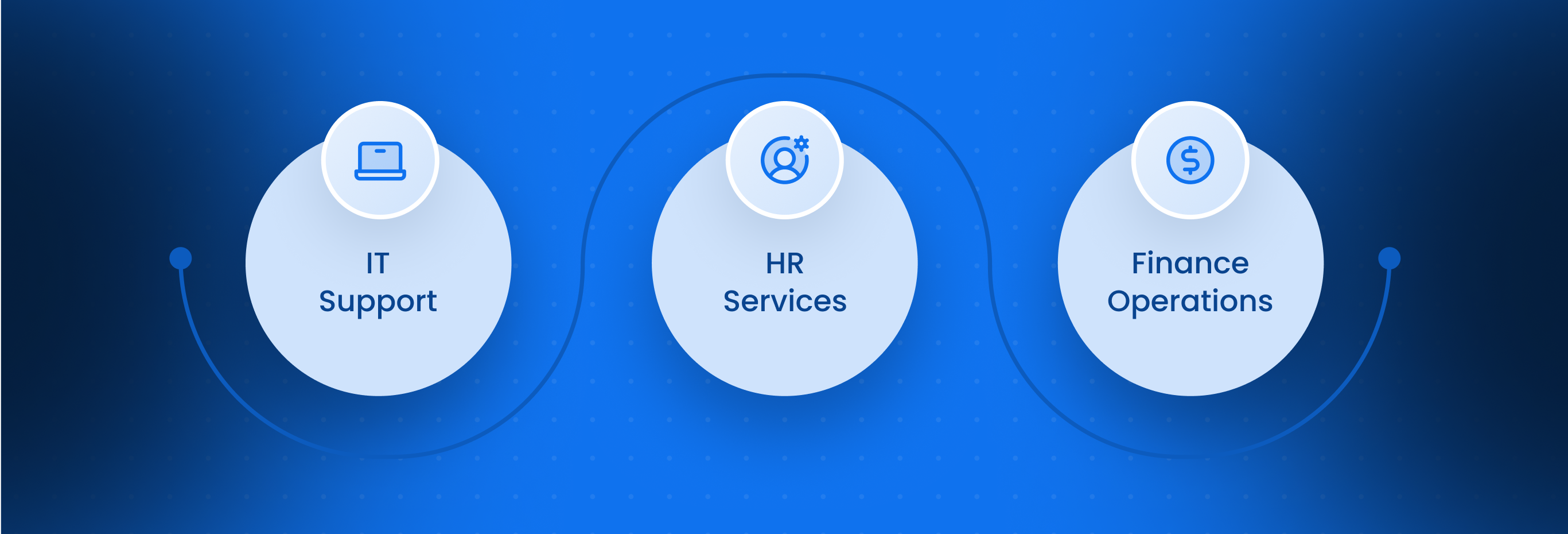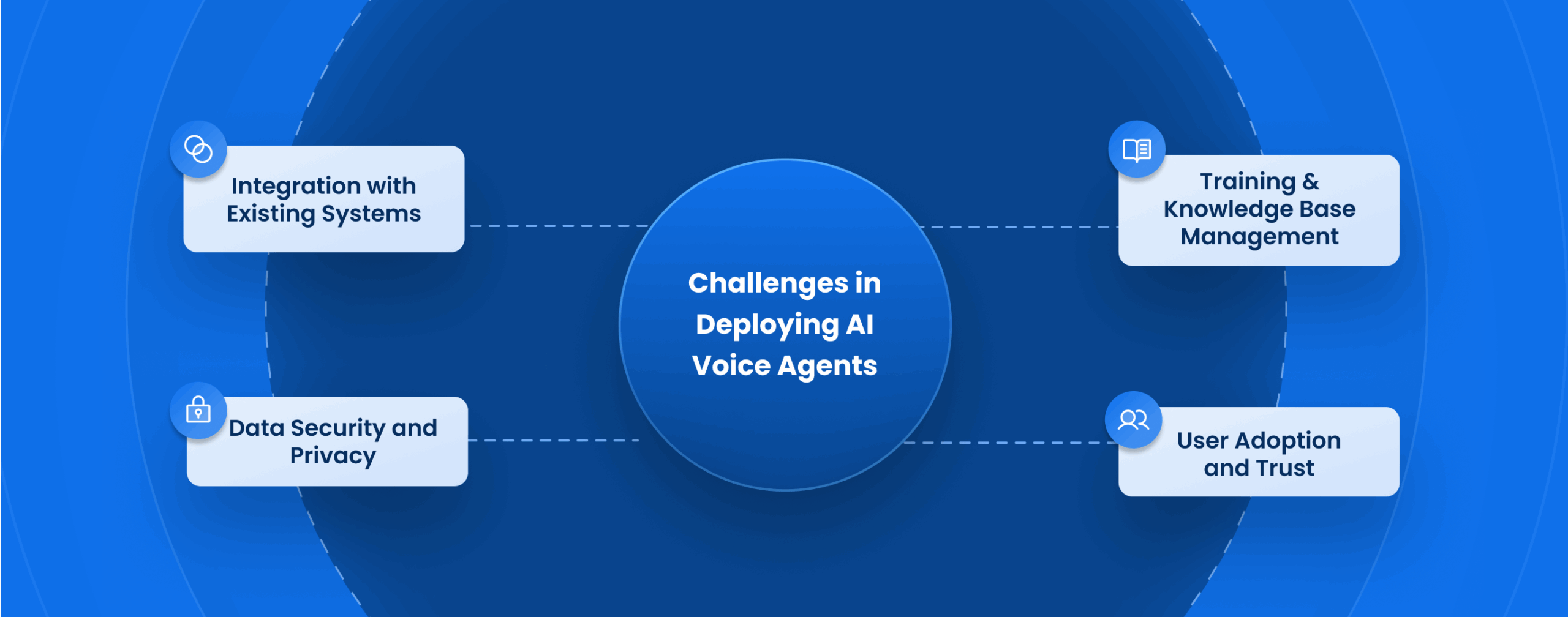Introduction
In the fast-paced world of large enterprises, employees often face a common hurdle: getting quick, accurate answers to their everyday questions about IT, HR, or Finance. Whether it’s resetting a password, understanding a new benefits package, or clarifying an expense report, these routine requests can consume valuable time and resources. Enter the AI voice agent , a sophisticated, intelligent assistant poised to redefine how your company handles internal support in 2025 and beyond. This isn’t just about automation; it’s about delivering a truly intelligent, seamless, and proactive support experience that liberates your teams and empowers your workforce.
What is an AI Voice Agent?
At its core, an AI voice agent is an advanced software system designed to understand and respond to human speech. Think of it as a virtual colleague who can converse naturally, comprehend complex requests, and then act on them. Unlike simple voice assistants that might answer basic queries, an enterprise-grade AI voice agent leverages cutting-edge artificial intelligence, particularly large language models, to engage in meaningful dialogues. It doesn’t just recognize keywords; it grasps context, sentiment, and intent, allowing it to provide accurate information, guide users through processes, or even complete tasks autonomously. This intelligent assistant becomes an integral part of your employee support infrastructure, accessible instantly and around the clock.
How AI Voice Agents Work
The magic behind an AI voice agent lies in its sophisticated architecture. First, when an employee speaks, advanced speech recognition technology converts their voice into text. Next, natural language understanding (NLU) comes into play, dissecting the text to understand the employee’s intent, even if the phrasing is complex or informal. For example, whether an employee says, “My laptop isn’t working,” or “I can’t log into my computer,” the system understands they need IT help for a login issue.
Once the intent is clear, the AI voice agent taps into a vast knowledge base, drawing on your company’s specific information for IT, HR, and Finance. Crucially, these agents are now equipped with generative AI capabilities. This means they can synthesize information and formulate human-like, contextual responses, rather than just pulling pre-scripted answers. If the agent needs more information, it asks clarifying questions, guiding the conversation naturally. Ultimately, it can resolve the issue directly, initiate a workflow (like submitting a ticket for a complex IT problem), or seamlessly hand off to a human expert with all the relevant context, ensuring a smooth transition. This continuous learning from interactions further refines its performance over time.
Key Use Cases of AI Voice Agents in Enterprises
For large US companies, the practical applications of an AI voice agent across various departments are transformative:
- IT Support: Imagine an employee calling in because they forgot their password. Instead of waiting on hold, an AI voice agent can instantly verify their identity and walk them through a secure password reset. Similarly, it can troubleshoot common network issues, guide users through software installations, or even diagnose hardware problems, initiating repair requests automatically. This significantly reduces the burden on your IT helpdesk, allowing human experts to focus on more strategic, complex issues.
- HR Services: From benefits inquiries to policy clarifications, HR departments field a multitude of repetitive questions. An AI voice agent can explain PTO policies, guide employees through enrollment in health plans, clarify payroll deductions, or provide updates on internal training programs. This empowers employees to get immediate answers, improving their experience and freeing up HR professionals for more sensitive and strategic initiatives.
- Finance Operations: Expense report status, procurement policies, invoice queries , these are all areas where an AI voice agent can provide instant support. It can help employees navigate the purchasing system, understand budgeting guidelines, or even assist with basic financial reporting questions, ensuring compliance and efficiency.
These examples highlight how an AI voice agent acts as a force multiplier, enhancing service delivery across the entire organization.

Benefits of Implementing AI Voice Agents
Embracing an AI voice agent brings a cascade of advantages that resonate deeply with technology leaders focused on efficiency, employee experience, and competitive edge.
-
Enhanced Employee Experience: Employees expect instant gratification. An AI voice agent provides 24/7, immediate support, eliminating wait times and frustration. This accessibility and speed translate directly into higher employee satisfaction, which is crucial for retention and productivity. Happy employees are productive employees.
-
Significant Cost Reduction: By automating a large percentage of routine inquiries, your organization can significantly reduce the operational costs associated with traditional support desks. This means optimizing staffing levels and reallocating human resources to higher-value tasks, creating substantial savings.
-
Increased Efficiency and Productivity: When employees can get answers instantly, they spend less time searching for information and more time on their core responsibilities. This boosts overall organizational productivity. For your support teams, the AI voice agent handles the simple, repetitive tasks, allowing human agents to focus on complex problem-solving and strategic initiatives.
-
Data-Driven Insights: Every interaction with an AI voice agent generates valuable data. This data can provide insights into common employee pain points, peak demand times, and areas where internal processes might be confusing. This information is gold for continuous improvement across IT, HR, and Finance departments, leading to proactive adjustments and better service delivery.
-
Scalability for Growth: As your company expands, so does the volume of internal queries. An AI voice agent can scale effortlessly to meet increasing demand without proportional increases in staffing or infrastructure, ensuring consistent service quality regardless of company size.
Challenges in Deploying AI Voice Agents
While the benefits are clear, successfully deploying an AI voice agent requires careful consideration of potential hurdles.
- Integration with Existing Systems: Large enterprises often have complex, legacy systems. Integrating a new AI voice agent seamlessly with existing IT service management platforms, human resources information systems, and financial software can be a technical challenge. It requires robust API capabilities and a deep understanding of your current tech stack to ensure smooth data flow and functionality.
- Data Security and Privacy: Handling sensitive employee data (payroll, health information, IT credentials) through an AI voice agent demands the highest level of security. Ensuring compliance with regulations like HIPAA, CCPA, and internal company policies is paramount. This means selecting a solution with enterprise-grade security features and transparent data handling protocols.
- Training and Knowledge Base Management: An AI voice agent is only as smart as the information it’s trained on. Building and maintaining a comprehensive, accurate, and up-to-date knowledge base across IT, HR, and Finance is an ongoing effort. It requires a commitment to continually feed the agent with relevant data and refine its understanding of company-specific terminology and processes.
- User Adoption and Trust: Employees may initially be hesitant to interact with an AI. Building trust requires demonstrating the agent’s accuracy, helpfulness, and ability to protect personal information. A smooth user experience and effective internal communication are key to encouraging widespread adoption.

Best Practices for AI Voice Agent Adoption
To maximize the success of your AI voice agent deployment, consider these best practices:
- Start Small, Scale Smart: Begin with a clearly defined pilot program in one department (e.g., IT password resets) to demonstrate value and gather feedback before expanding.
- Focus on the Employee Experience: Design conversations that are intuitive, empathetic, and truly helpful. The goal is to make interactions with the AI voice agent feel natural and efficient.
- Invest in Your Knowledge Base: A robust, well-maintained, and easily searchable knowledge base is the foundation of an intelligent AI voice agent. Continuously update it with new information and refine existing entries.
- Promote and Educate: Clearly communicate the benefits of the new system to your employees. Provide training on how to interact with the AI voice agent effectively, setting realistic expectations.
- Monitor and Iterate: Regularly review performance metrics, user feedback, and escalation patterns. Use these insights to continuously improve the AI voice agent’s accuracy, efficiency, and overall effectiveness. This ongoing optimization is crucial for long-term success.
The Future of AI Voice Agents
Looking ahead to 2025 and beyond, the evolution of the AI voice agent is set to accelerate even further. We’ll see even greater sophistication in understanding complex, multi-turn conversations and emotional nuances. Generative AI will allow agents to proactively identify potential problems, offering solutions before employees even realize there’s an issue. Imagine an AI voice agent notifying an employee about an upcoming VPN certificate expiry and guiding them through the renewal process automatically.
Furthermore, the integration of voice biometrics will enhance security and personalization. AI voice agents will become integral components of a “digital workplace fabric,” seamlessly interacting with other enterprise applications and tools, creating a truly unified and intelligent support ecosystem. The goal is to move towards hyper-automation, where routine tasks are handled effortlessly, leaving human talent free to innovate and solve truly unique challenges.
How Leena AI is Driving the Next Generation of AI Voice Agents
At Leena AI, we understand the unique challenges and immense potential of deploying intelligent automation within large enterprises. We are pioneering Agentic AI in IT and across HR and Finance, moving beyond simple automation to truly autonomous problem-solving. Our AI voice agent solutions are built specifically for the complexities of corporate environments, designed to empower your employees and revolutionize your support functions.
Leena AI’s platform leverages cutting-edge large language models to deliver an AI voice agent that not only understands natural language but also takes intelligent action. For IT, our agent can proactively detect issues, open tickets, guide employees through troubleshooting, and resolve common problems like password resets or software installation failures, drastically reducing your Mean Time to Resolution. We ensure seamless integration with your existing IT service management systems like ServiceNow, Jira, and Salesforce, making deployment straightforward. For HR and Finance, our voice agent provides instant, accurate answers to a myriad of queries, enhancing employee satisfaction and freeing up your specialized teams.
Our focus is on delivering a solution that is secure, scalable, and provides demonstrable return on investment, aligning perfectly with your strategic objectives for 2025. With Leena AI, you’re not just adopting an AI voice agent; you’re embracing a future where enterprise support is intelligent, effortless, and always available.
Frequently Asked Questions
1. What is the primary benefit of an AI voice agent for large companies?
The main benefit is significantly enhanced efficiency and employee satisfaction. An AI voice agent provides instant, 24/7 support for routine IT, HR, and Finance queries, reducing wait times and freeing human teams for more complex tasks.
2. How does an AI voice agent handle sensitive employee information?
Enterprise-grade AI voice agents like those from Leena AI are built with robust security protocols, including end-to-end encryption, secure authentication methods, and compliance with data privacy regulations such as HIPAA and CCPA, ensuring your data is always protected.
3. Can an AI voice agent truly understand complex employee requests?
Yes, modern AI voice agents leverage advanced natural language understanding and generative AI to comprehend complex, multi-turn conversations, understand context, and even detect sentiment, allowing them to provide highly accurate and relevant responses.
4. Will an AI voice agent replace human support staff?
The goal of an AI voice agent is not to replace human staff but to augment them. It handles routine inquiries, allowing human experts to focus on complex, high-value, and sensitive issues, leading to a more strategic and productive support team.
5. How long does it typically take to deploy an AI voice agent in an enterprise setting?
Deployment timelines vary based on integration complexity and the scope of the knowledge base. However, solutions like Leena AI are designed for streamlined integration with existing enterprise systems, allowing for pilot programs to go live within weeks, with full-scale deployment following a phased approach.
6. What makes Leena AI's approach to AI voice agents unique?
Leena AI specializes in Agentic AI, meaning our AI voice agents go beyond simple responses to actively resolve issues. We focus on deep integration across IT, HR, and Finance, providing a comprehensive, intelligent solution tailored for large enterprises, ensuring real business value.
7. How does an AI voice agent contribute to an improved employee experience?
An AI voice agent elevates the employee experience by offering immediate, round-the-clock access to support, eliminating frustrating wait times, and providing consistent, accurate information, ultimately empowering employees to resolve issues quickly and independently.













